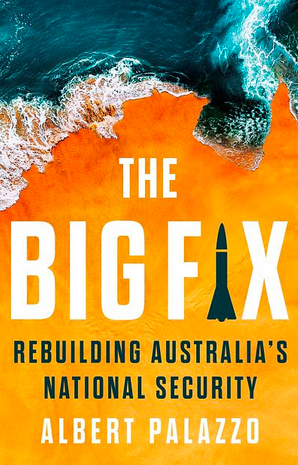An urgent call for a new Australian defence policy
The character of war is constantly changing, and so too must the approach to national security. But Australia’s defence policy is broken. Successive governments have not approached the nation’s security with the intelligence, resoluteness and seriousness it requires.
After more than 120 years of defence policy centred on dependency, the geopolitical situation demands new thinking by politicians and policymakers to secure the nation for the future. In light of technological progress, the shifting balance of power in the Pacific and the worsening danger of climate change, Australia needs a new approach in order to charts its own course.
In The Big Fix, defence strategist Albert Palazzo proposes a defence policy centred on the strategic defensive, which presents the best military fit for Australia, given its geography and the current state of military technology. Crucially, he elevates climate change to primacy in the national security hierarchy and explains how we cannot afford to ignore it as a security factor. And he asks: what is stopping Australia’s leaders from seriously considering other options for the nation’s security?
Excerpts from The Bix Fix: Rebuilding Australia’s national security, by Albert Palazzo, Melbourne University Press, 2025.
The need for a grand strategy
Grand strategy involves more than just military power and is different from military strategy. Rather, ‘grand strategy considers all the resources at the disposal of the nation (not just military ones), and it attempts to array them effectively to achieve security in both peace and war’. Thus, grand strategy is a whole-of-government activity and its stakeholders are not limited to a Department of Defence. Every nation’s diplomatic, economic, demographic, environmental, cultural and social representatives have inputs into the development of grand strategy, as well as the making of the policy to achieve it… p.92
Murray points out that to achieve a useful grand strategy requires an acceptance that the future is unforeseeable. Consequently, the only guide for those thinking about grand strategy is the past, for which they must have a deep understanding, and the present which requires a comprehensive and realistic appreciation. The other requirement is that one must possess deep knowledge and a clear-eyed assessment of one’s opponents and also of oneself. Making useful grand strategy does not suffer fools… p.93
The provision of six [capability] effects is a big ask for any military organisation, especially one with the size and resources of the ADF. The demand is even more challenging when several of the tasks are in conflict with one another and the government has elected not to provide any sense of priority. Hence, the government expects the ADF to be simultaneously able to protect the continent and project force overseas while holding an adversary at a distance and being ready to engage in close combat. Each of these tasks requires different equipment, training and doctrine and together would challenge a military that is much larger and more capable than the ADF. How this is to be resolved is left to the imagination of the Australian public…p.101

